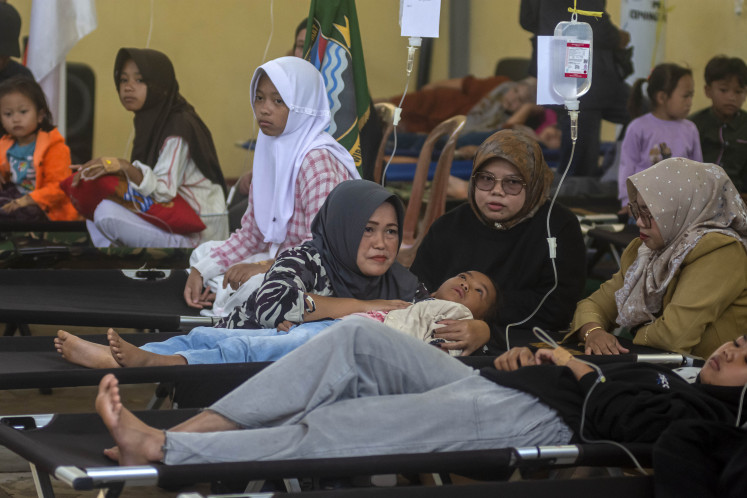Popular Reads
Top Results
Can't find what you're looking for?
View all search resultsPopular Reads
Top Results
Can't find what you're looking for?
View all search resultsFirst successful liver transplants performed
Indonesians with chronic and irreversible liver dysfunction no longer need to go abroad for hepatic transplantations, as two patients underwent successful liver transplants at a national public hospital recently
Change text size
Gift Premium Articles
to Anyone
I
ndonesians with chronic and irreversible liver dysfunction no longer need to go abroad for hepatic transplantations, as two patients underwent successful liver transplants at a national public hospital recently.
Abdul Mukri, 44, and first grader Aulia Apriansyah, 6, were the first patients in Indonesian history with end-stage liver diseases to have successful liver transplants.
The surgery was performed at Cipto Mangunkusumo General Hospital (RSCM) in Jakarta.
“This shows that Indonesia has become one of the most advanced centers for hepatic transplantations, providing affordable, safe liver transplants,” said RSCM director Akmal Taher at a press conference on Thursday.
The hepatic transplantation team, made up of 34 doctors, performed the liver transplants of Abdul and Aulia in two separate surgeries in mid-December last year.
“This achievement also indicates the successful transfer of knowledge of liver transplant surgery within our medical system,” Akmal said, referring to the fact that the successful open-heart surgeries were supported by a hepatic transplantation team led by Shu-Sen Zheng, a professor of hepatobiliary and pancreatic diseases at the First Affiliated Hospital at the Zhejiang University’s School of Medicine in Hangzhou, China.
Liver transplants had been attempted before in Indonesia, but were unsuccessful.
Abdul was diagnosed with chronic liver disease in 2005.
“I felt weak and tired all the time. I also constantly felt sick to my stomach,” he said, adding that he even vomited blood.
It was not easy for Abdul to find a living donor liver transplant as required by doctors, as his two donor candidates — his brother and brother-in-law — were declared ineligible to donate portions of their healthy livers to him.
Liver transplants have long been seen as one of the most complicated surgical procedures. But living donor liver transplants present greater difficulties because the patients require a portion of a healthy liver from a living donor, who should come from the patient’s close family.
Abdul was finally able to get a liver transplant after doctors confirmed his daughter, Nisa Azzahra, 18, was eligible to be his liver donor.
“I just wanted to see my dad healthy, so I had to push away my fears,” she said. Abdul’s successful transplant surgery was performed on Dec. 13, 2010, after six months of preparation. After a two-month recovery program, his life is returning back to normal.
“After a string of observations, evaluations, the transplant surgery and recovery process, we can conclude that his liver transplant surgery was completely successful,” said Sastiono, a surgery specialist from RSCM, who led the liver transplant surgery.
Aulia, a patient with Hepatitis Autoimmune, can now go through his daily activities without feeling exhausted all the time.
“He can go to school and play with his friends as if he never suffered from chronic liver disease,” said Aulia’s father, Haryanto, a Navy official. He donated a portion of his liver to his son.
Despite the recent achievements, liver transplant surgery in Indonesia still faces obstacles as few people are ready to donate a portion of their healthy liver.
“I must say that we should not be afraid to become living liver transplant donors,” said Sastiyono. In principle, he said, donating a portion of a liver was quite different from other organ donations such as kidneys and eyes.
“Liver donations are quite similar to blood donations because the donated organ can recover in stages,” he said, adding that the availability of donors should no longer be a significant obstacle in hepatic transplantations in Indonesia.
Local liver transplant surgery is a more cost-effective option for patients who cannot afford one abroad. A hepatic transplantation in Singapore costs about Rp 3 billion (US$342,000).
“We hope improved hepatic transplantations in Indonesia will deliver simpler, more affordable treatment direly needed by people with chronic liver diseases,” Akmal said, adding that, as of last year, the number of Indonesians with chronic and irreversible liver dysfunction reached 20 million. (ebf)










